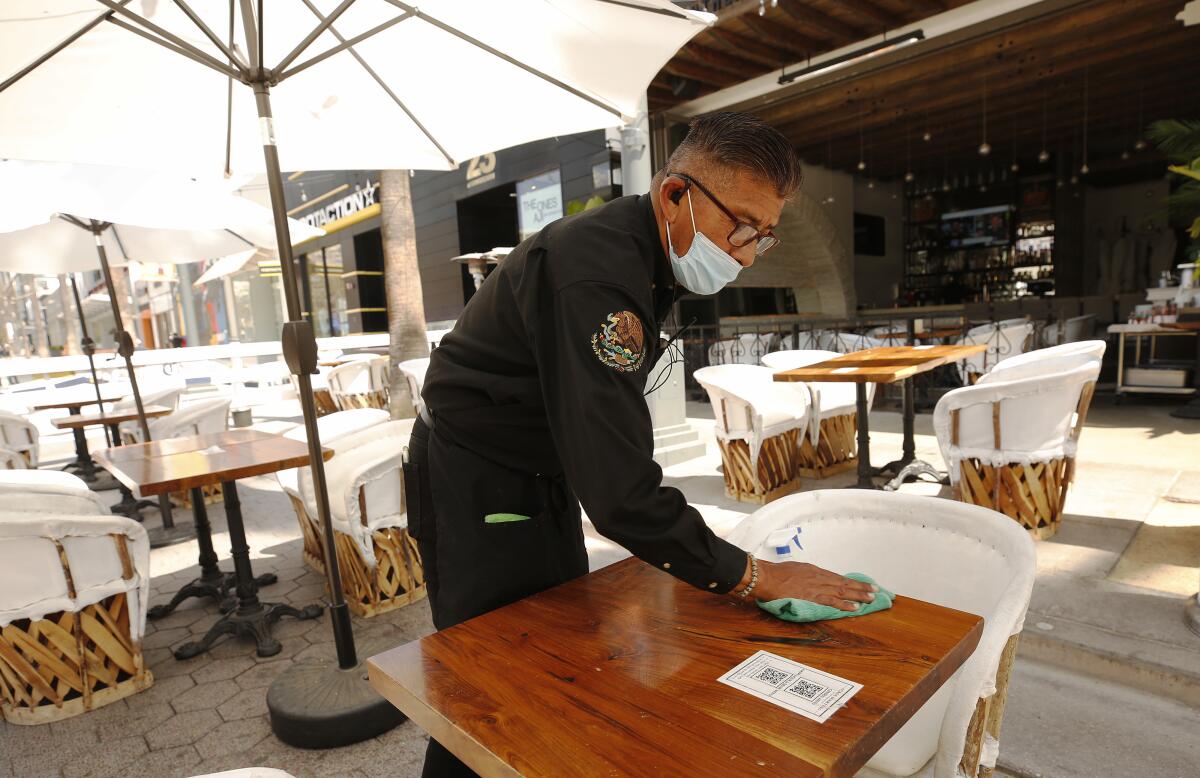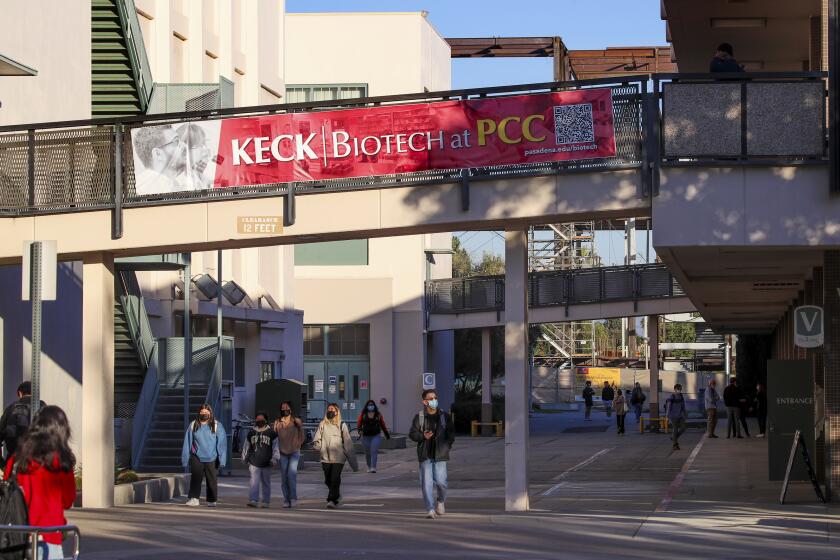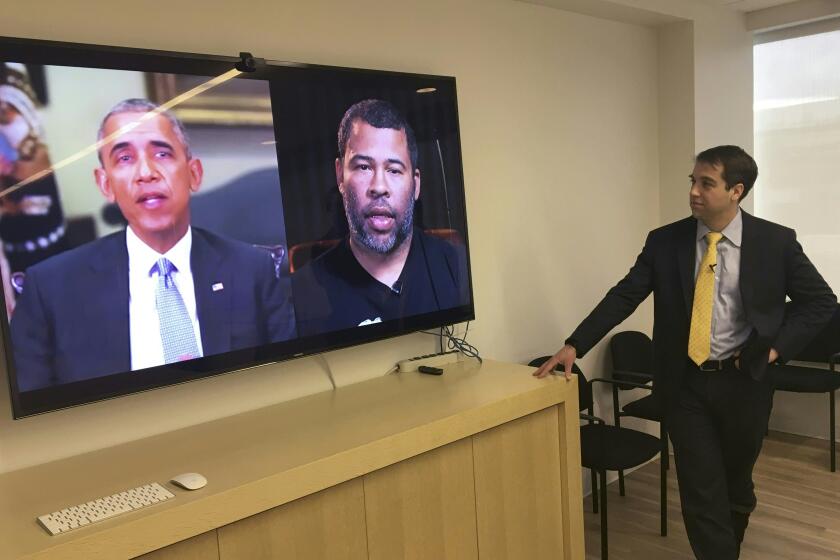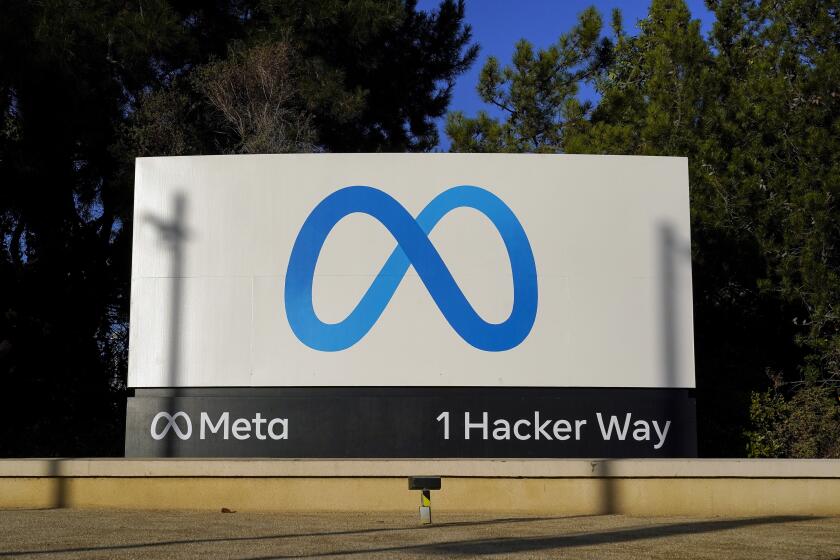Free money is still available for small L.A. businesses affected by the pandemic

- Share via
With the pandemic state of emergency over, government programs tied to COVID-19 either have ended or are winding down. But if you have a small business in Los Angeles that was affected by the pandemic — and which ones weren’t? — you still have time to apply for a shot of free money.
The city of Los Angeles is offering up to $15,000 to qualified small businesses in the city that missed rent payments during the pandemic. Applications for those funds are due by the end of the day Wednesday.
The county Department of Economic Opportunity, meanwhile, is offering Economic Opportunity Grants that small businesses and nonprofits affected by the pandemic can use for such things as operational expenses and pandemic-related costs. Those applications have to be submitted by May 31.
Here are the details on who’s eligible and how to apply.
Commercial rent relief in the city of L.A.
The city’s Economic & Workforce Development Department is nearing the end of its third round of grants to help businesses make overdue rent payments. About $1.8 million remains of the $8.5 million the city set aside for small-business rent relief, using money from the federal American Rescue Plan Act.
The grants can be spent only on rent debt accrued during the pandemic — to be precise, from March 1, 2020, through April 30, 2023. And you’ll have to specify how the pandemic hurt your business.
To qualify, your annual revenue must be $5 million or less. But the business doesn’t have to be your main source of income; if you’ve fallen behind on your rent payments on the L.A. garage where you store the cars you customize at night and on weekends, for example, you can still qualify.
There are a number of eligibility rules that will disqualify many of the city’s entrepreneurs and startups. Aid is available only to for-profit businesses in the city that have a current L.A. business tax registration certificate, and only if they have a valid lease for commercial property — work-from-home operations and entities with subleases are not eligible. The business must have been operating on or before March 1, 2020, and it cannot have received aid in the city’s two previous rounds of rent relief.
California is offering cash to students and community groups to spread the word about a $2,500 grant for students who lost jobs because of COVID-19.
The city has declared a long list of businesses ineligible for these grants, including lenders, insurers, landlords, publicly traded companies, gun dealers, lobbying firms and day traders. Also excluded are many of the enterprises dedicated to, shall we say, less-productive activities, such as cannabis-related operations, nightclubs, liquor stores, psychics, massage services and gambling sites.
Jamie Francisco, spokesperson for the Economic & Workforce Development Department, said in an email that the grants won’t be awarded on a first-come, first-served basis, so it won’t hurt to apply at the last minute. Instead, she said, recipients will be selected through a lottery, although two types of applicants will have a higher chance of getting picked: those in low- and moderate-income communities, and those from more disadvantaged census tracts.
Grant recipients will be notified in early July, Francisco said. If there’s any funding left over, she said, the department will look at the results and decide whether to do another round or shift the money to another relief program for small businesses.
Grant applications are available on the department’s website. For free in-person assistance, visit one of the department’s 10 BusinessSource centers around the city. To prove your business’ eligibility, you’ll need to submit copies of multiple documents, including your business tax returns from 2019 and 2020, the lease for your business property and proof of your previous rent payments.
In a frightening use of deepfake technology, scammers are using AI-powered audio and video to pass themselves off as their targets’ relatives or loved ones in real time.
Aid for small businesses in L.A. County
The county’s Economic Opportunity Grant program has collected $54 million from the state and federal governments to provide relief to businesses and nonprofits in the county that have been significantly affected by the pandemic. It’s using the funds to provide five types of grants to applicants, based on the amount of revenue they collect annually and their location.
The money can be used to buy equipment, invest in operations, pay wages or other business expenses, and cover costs related to COVID-19. It cannot be used for anything else. The larger grants also bar applicants from spending the money on anything that has been or will be covered by other federal relief programs.
Only businesses that are still operating in L.A. County are eligible. Apply online at the Economic Opportunity Grant program website; for assistance, visit the program’s help page or call (833) 364-7268. Help is available in 15 languages, including English, Spanish, Cantonese, Mandarin and Korean.
Using state tax dollars, the Economic Opportunity Grant program offers $2,500 to the smallest of small businesses: those with five or fewer full-time-equivalent workers (including those with no workers other than the owner) and less than $50,000 in gross revenue in 2019. They must have started operations before the end of 2019, and can be located anywhere in the county, including the city of Los Angeles.
To apply, you must be the owner of the business, and it must be your primary source of income — no side hustles in this category. And if you’ve already received a California Small Business COVID-19 Relief Grant, you can’t obtain another one.
The full list of eligibility requirements, which can be found on the program’s website, details a host of excluded ventures, including lenders, stock traders, lobbyists, strip clubs, or “a business engaged in any socially undesirable activity or activity that may be considered predatory in nature, such as rent-to-own businesses or check-cashing businesses.”
Using federal dollars from the American Rescue Plan Act, the program is also offering grants of up to $20,000 to small businesses in the county outside the city of Los Angeles, and grants of up to $25,000 to nonprofits that serve the entire county, including those based in the city of Los Angeles. Applicants in both groups must have started operations before the end of 2021.
Here’s how those grants break down:
- $15,000 for microbusinesses with less than $100,000 in revenue in 2019, 2020 or 2021.
- $20,000 for small businesses with $100,000 to $2 million in revenue in 2019, 2020 or 2021.
- $20,000 for nonprofit social service organizations with less than $1 million in revenue in 2019, 2020 or 2021.
- $25,000 for nonprofit social service organizations with $1 million to $5 million in revenue in 2019, 2020 or 2021.
A judge has tentatively approved a $725-million payout by Facebook’s owner to settle claims that the social network shared user data without consent.
As with the other grant programs, the county has a list of businesses that are not eligible. These include lenders, insurers, pawnshops, palm readers, nightclubs, liquor stores, cannabis businesses, strip clubs, junk stores and gun dealers. Food industry applicants have one extra requirement: They can’t have a failing grade from the county Department of Public Health.
Jay Tsao and Tova Mac of Align Organization, which is doing outreach for the program, said the aid is available to small-business owners even if the business isn’t their primary source of income. Applicants will have to provide tax returns to prove that their business meets the income limits, though, as well as some kind of evidence that you’re the owner of a real business — for example, a copy of a business or professional license.
The county has already started awarding the $2,500 grants to the smallest businesses, Mac said, but there is still money remaining in that program. The larger grants won’t be awarded until after the application window closes May 31, she said; Tsao said the program expects to make those awards “prior to the middle of the year.”
Thousands of applications for the larger grants have already been received, he said, so there will probably be more demand for dollars than there is supply. But the county won’t award the grants on a first-come, first-served basis, Mac said; instead, the county will be guided by the priorities it has set for its American Rescue Plan Act funding.
For nonprofits, she said, the county’s priorities include organizations that serve the unhoused and offer training, education and other programs for youth. And although the small-business grants are for everyone, Tsao said, the county is focusing its outreach efforts on underserved communities and those hit hardest by the pandemic.
Danny Kelleher, assistant director for economic development at the L.A. County Department of Economic Opportunity, said in an email that the county “developed an Equity Explorer tool that uses a COVID Vulnerability and Recovery Index that categorizes census tracts in the county into five tiered levels of vulnerability and recovery need.” The grant program “targets businesses with the highest need for assistance by utilizing the Equity Explorer tool to award grants to businesses designated in the highest, high, and moderate tiers,” he said.
About The Times Utility Journalism Team
This article is from The Times’ Utility Journalism Team. Our mission is to be essential to the lives of Southern Californians by publishing information that solves problems, answers questions and helps with decision making. We serve audiences in and around Los Angeles — including current Times subscribers and diverse communities that haven’t historically had their needs met by our coverage.
How can we be useful to you and your community? Email utility (at) latimes.com or one of our journalists: Jon Healey, Ada Tseng, Jessica Roy and Karen Garcia.
More to Read
Inside the business of entertainment
The Wide Shot brings you news, analysis and insights on everything from streaming wars to production — and what it all means for the future.
You may occasionally receive promotional content from the Los Angeles Times.














